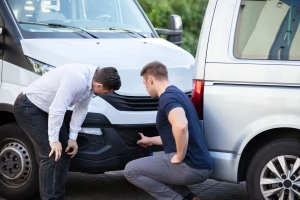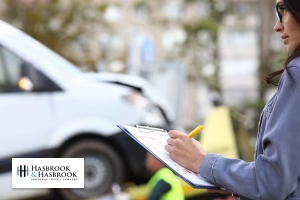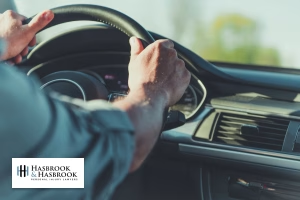Accidents with commercial vehicles are often much more dangerous than those involving regular cars. These vehicles are heavier, harder to stop, and cause more damage when they crash. When a commercial truck hits a smaller car, the results can be severe or even deadly.
are often much more dangerous than those involving regular cars. These vehicles are heavier, harder to stop, and cause more damage when they crash. When a commercial truck hits a smaller car, the results can be severe or even deadly.
Hasbrook & Hasbrook Personal Injury Lawyers helps accident victims who have been hit by large trucks or other commercial vehicles. We know how complex these cases can get. There may be multiple parties involved, and insurance companies usually fight hard to avoid paying. Our team steps in to protect your rights and pursue the compensation you deserve.
If you were hurt in a commercial vehicle crash, it’s important to act fast. We’ll explain what these vehicles are, why these crashes are more complicated, who may be responsible, and what steps to take after the accident.
What Is Considered a Commercial Vehicle?
A commercial vehicle is any vehicle used for business or commercial purposes. These vehicles are not for personal use. They’re used to transport goods, equipment, or people. Some are very large and heavy, which makes them more dangerous in crashes.
Large trucks, delivery vans, buses, and construction vehicles are all considered commercial vehicles. Many of these vehicles are owned by companies, not individuals. This means different rules and insurance policies apply when they’re involved in accidents.
Crashes involving commercial vehicles are often more serious than regular car accidents. According to the National Safety Council, fatal crashes involving large trucks have increased in recent years. Because these vehicles are larger and heavier, they’re more likely to cause serious injuries or deaths in a crash.
If you were hurt in a commercial vehicle crash, you may have a right to seek compensation from the driver, company, or others involved.
Common Types of Commercial Vehicles
- Semi-trucks or 18-wheelers – Used to carry large shipments over long distances. Also known as large trucks.
- Box trucks – Smaller than semis, used for deliveries or moving services.
- Delivery vans – Common with companies like Amazon or UPS.
- Buses – Transport passengers and must follow special safety rules.
- Dump trucks – Used in construction to haul materials.
- Flatbed trucks – Carry wide or oversized loads that may be harder to secure.
- Tankers – Often carry hazardous materials and can cause major damage if they spill.
- Tow trucks – Used to move disabled vehicles from roads or crash scenes.
Why Commercial Vehicle Accidents Are More Complicated
 Crashes involving commercial vehicles are not handled the same way as regular car accidents. They involve more rules, more parties, and more serious consequences.
Crashes involving commercial vehicles are not handled the same way as regular car accidents. They involve more rules, more parties, and more serious consequences.
Larger Size and Greater Damage Potential
Large trucks are much bigger and heavier than passenger vehicles. A fully loaded semi-truck can weigh up to 80,000 pounds. That weight makes it harder to stop and causes more damage in a crash.
When commercial trucks crash into smaller vehicles, the impact is usually severe. These truck crashes can lead to traumatic brain injuries, spinal injuries, or even death. Large truck occupants may walk away with fewer injuries, while passenger vehicle drivers often suffer the most.
The size of these trucks also makes them harder to control. If the driver isn’t trained well or is too tired, the risk of fatal crashes increases. Because of the size and weight difference, these crashes almost always result in serious consequences for everyone involved.
Commercial Insurance Policies Have Higher Coverage
Trucking companies usually carry large insurance policies. These policies are meant to cover major injuries, large vehicle repairs, and even deaths. But just because the coverage is high doesn’t mean the insurance company wants to pay.
Insurance companies often push back harder in large truck crashes. They may deny fault, shift blame, or offer a very low settlement. That’s because a full payout could cost them hundreds of thousands — or even millions — of dollars.
Your lawyer must be ready to deal with this kind of resistance. Fighting for fair compensation in a commercial vehicle crash takes time, skill, and strong evidence.
State and Federal Regulations Apply
Unlike regular drivers, commercial drivers must follow rules from both state and federal agencies. These rules are designed to protect everyone on the road. They include limits on driving hours, rest breaks, truck weight, and more.
The Federal Motor Carrier Safety Administration (FMCSA) sets many of these rules. If a driver or company breaks these rules, it can help prove fault in a commercial vehicle crash.
A lawyer must understand these laws to check for violations. If the driver worked too many hours or skipped inspections, that could be the key to your case. These legal rules make commercial crashes more complex than regular car accidents.
Common Causes of Commercial Vehicle Accidents
Many crashes involving large trucks happen because of human error, poor maintenance, or company negligence. Some of the most common reasons behind these dangerous accidents are:
Distracted or Fatigued Driving
Truck drivers often work long shifts. Even with rules in place, some push past legal limits. Fatigue affects focus, slows reaction time, and increases the chance of a crash. Distractions also play a role. Using a phone, eating, or adjusting the radio can pull the driver’s eyes off the road. In a large truck, even a few seconds of distraction can lead to deadly results.
Crashes involving commercial trucks and passenger vehicles often happen when the driver is too tired or not paying attention. These crashes can lead to fatal injuries for passenger vehicle drivers and serious harm for truck occupants, too.
Speeding or Aggressive Driving to Meet Delivery Deadlines
Many trucking companies expect deliveries on tight schedules. That pressure leads some drivers to speed or take risks to stay on time. Large trucks need more distance to stop. When a truck is going too fast, it’s harder to avoid crashes, especially in traffic or bad weather. Aggressive lane changes or tailgating also put others in danger.
Speeding is one of the top causes of fatal crashes involving large trucks. It turns a minor mistake into a major disaster. When pressure from deadlines leads to reckless driving, both the driver and the company may be held responsible.
Poor Vehicle Maintenance or Equipment Failure
Commercial trucks drive thousands of miles every week. That kind of wear and tear means regular maintenance is critical. If a company skips inspections or delays repairs, it can lead to serious accidents. Brakes, tires, and lights must be checked often.
A worn tire or failed brake system can cause a truck to lose control. If that happens at high speed, the crash may involve several vehicles. Crashes caused by poor maintenance are often the result of cost-cutting. When safety is ignored, the lives of truck occupants and other drivers are put at risk.
Improperly Loaded or Overloaded Cargo
Cargo must be loaded evenly and secured tightly. If it’s not, the truck can tip, lose balance, or spill materials onto the road. Overloaded trucks are also harder to stop and control. In crashes involving commercial vehicles, shifting or falling cargo is often a hidden cause. These crashes may seem like driver error, but the real problem could be poor loading.
When a third-party loader or the company itself fails to follow safety guidelines, they may be legally responsible for the accident.
Who Can Be Held Liable in a Commercial Vehicle Accident?
 Commercial vehicle accidents often involve more than just one person or company. These crashes are more complex than regular car accidents because there may be several parties that share responsibility. Each one must be investigated closely to determine who caused or contributed to the crash.
Commercial vehicle accidents often involve more than just one person or company. These crashes are more complex than regular car accidents because there may be several parties that share responsibility. Each one must be investigated closely to determine who caused or contributed to the crash.
The Commercial Driver
The commercial driver is often the first person investigated after a crash. If the driver was speeding, distracted, fatigued, or under the influence, they can be held directly responsible for the accident. Driver error is a major cause of many fatal crashes involving large trucks.
Commercial drivers must follow strict safety rules and are expected to drive responsibly at all times. If they violate these rules or act carelessly behind the wheel, they can face both civil and criminal consequences. When a truck driver causes harm to others on the road, they may be personally liable for the damages suffered by passenger vehicle drivers or other accident victims.
The Employer or Company
In most cases, the trucking company or employer is also responsible for what their drivers do on the road. If the company failed to properly train the driver, ignored safety concerns, or pressured the driver to work past legal limits, they may be held liable for the crash.
Companies are also required to follow federal regulations that apply to commercial trucks. If they ignore these rules (by overloading vehicles, skipping maintenance, or hiring unqualified drivers), they can be directly responsible for crashes involving large trucks.
Employers may also be liable simply because they own the vehicle and control the driver’s work. In those cases, the law allows accident victims to hold the company accountable for what happened.
Maintenance Contractors or Vehicle Manufacturers
In some commercial vehicle crash cases, the fault lies with the people or companies responsible for maintaining the truck or building its parts. If a mechanic fails to fix faulty brakes or if a tire company produces a defective product, that failure can cause a deadly accident.
Commercial trucks require regular inspections and upkeep. If the person or company hired to maintain the vehicle skipped important safety steps, they may be responsible for the crash. Likewise, if a part fails due to a defect, the manufacturer may be held accountable under product liability laws.
Truck crashes caused by mechanical failure or part defects require a deep investigation to find the real cause. A lawyer will often work with experts to trace the problem back to the responsible party.
Third-Party Loaders or Dispatch Services
Some trucking companies hire third-party services to handle cargo loading, dispatching, or delivery scheduling. If these services do their jobs carelessly, they can contribute to a serious crash.
For example, if cargo is loaded unevenly or allowed to shift during transport, it can throw the truck off balance. Overloaded trailers make it harder for drivers to brake or steer safely. These types of mistakes can lead to major crashes involving commercial trucks and other vehicles on the road.
Dispatch services may also push drivers to meet unsafe deadlines or travel in unsafe conditions. If their instructions play a part in causing the accident, they can be named as another responsible party in your case.
FAQs
1. Are commercial vehicle crashes more dangerous than regular car accidents?
Yes. Crashes involving large trucks often cause far more damage than typical car accidents. Because large trucks are heavier and harder to stop, they pose a greater threat to passenger vehicles.
2. Who is most at risk in truck crashes involving commercial vehicles?
In most truck crashes, the people in passenger vehicles suffer the worst injuries. The truck occupants are usually protected by the size and structure of the vehicle, while those in smaller cars or SUVs absorb most of the impact.
3. Can more than one person or company be responsible for a commercial vehicle crash?
Yes. In many commercial vehicle crash cases, several parties may be held liable. This includes the driver, the trucking company, third-party cargo loaders, maintenance crews, or even the company that made the truck parts.
4. Do commercial trucks have different insurance coverage than regular cars?
Yes. Commercial trucks carry much higher insurance limits than personal vehicles because they are more likely to cause large-scale damage.
5. What should I do if I’m in a crash with a commercial truck?
After the accident, call the police and get medical care right away, even if you don’t feel hurt at first. Try to gather photos, contact information, and any details about the truck or company.
Contact Our Oklahoma Car Accident Lawyer for a Free Consultation
 If you or someone you love has been involved in a commercial vehicle crash, it’s important to act quickly. These accidents can leave you facing painful injuries, expensive medical bills, and pressure from insurance companies. You shouldn’t have to face it all alone.
If you or someone you love has been involved in a commercial vehicle crash, it’s important to act quickly. These accidents can leave you facing painful injuries, expensive medical bills, and pressure from insurance companies. You shouldn’t have to face it all alone.
Hasbrook & Hasbrook Personal Injury Lawyers has experience handling complex cases involving large trucks and other commercial vehicles. We know how to deal with trucking companies, challenge unfair insurance practices, and hold every responsible party accountable. Whether you’re dealing with truck crashes, serious injuries, or wrongful death, we’re here to help.
Our team will listen to your story, review your case, and explain your legal options clearly. The consultation is free, and you don’t pay unless we win for you. Call today or fill out our online form to speak with an Oklahoma car accident lawyer. We’re ready to fight for the justice and compensation you deserve. Understanding the impact of traffic violations in Oklahoma is crucial for your case, as these infractions can significantly affect liability and compensation. Our experienced attorneys will help you navigate these complexities, ensuring that all aspects of your situation are taken into account. Let us work together to build a strong case that addresses both the immediate and long-term effects of your accident.










